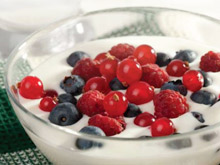Health Topics
-
Healthy Living
-
|
|
March 2010
|
| 10 Immunity Boosting Foods |
| Sunita Pant Bansal |
| |
 |
Natural Yoghurt
Probiotics, or the ‘live active cultures’ found in natural yoghurt, are healthy bacteria that keep the digestive tract free of disease-causing germs. |
Probiotics stimulate the white blood cells into action against the bad bacteria, while helping the good bacteria of the stomach in aiding the digestion. Two bowls of yoghurt in a day is not difficult to have – in case it is, then you can have buttermilk or lassi.
Almond
A handful of almonds munched while working, during the day, protect your immune system from the effects of stress. A 50g serving carries nearly 50 percent of the daily recommended amount of vitamin E. This important vitamin stimulates the production of natural killer cells, those that seek out and destroy germs and cancer cells. It also enhances the production of B-cells, the immune cells that produce antibodies that destroy bacteria. Vitamin E also reverses some of the decline in immune response commonly seen in ageing and helps in lowering the risk of cardiovascular disease. Apart from vitamin E, Almonds also have riboflavin and niacin (B vitamins) that help you bounce back from the effects of stress.
Cabbage
Cabbage is another source of immunestrengthening glutathione. It is an easily available, inexpensive immune boosting vegetable. Try adding cabbages of any variety (white, red) to salads, soups and stews to sneak in extra antioxidants and boost your meal’s nutritional value.
Garlic
Garlic offers several antioxidants that battle the immune system invaders. This potent onion relative contains the active ingredient allicin, which fights infection and bacteria. Among garlic’s targets are the bacteria associated with stomach ulcers and stomach cancer. Two cloves of crushed garlic a day – can easily be added to any dish – will go a long way in boosting your immunity.
Grapefruit, Orange
Citrus fruits like grapefruits and oranges have a good amount of vitamin C. Vitamin C increases the production of infection-fighting white blood cells and antibodies and increases levels of interferon, the antibody that coats cell surfaces, preventing the entry of viruses. Vitamin C reduces the risk of cardiovascular disease by raising levels of HDL (good) cholesterol while lowering blood pressure and interfering with the process by which fat is converted to plaque in the arteries. Grapefruit is also packed with flavonoids – natural chemical compounds that increase immune system activation. Six to seven servings of fresh fruits and vegetables in a day are sufficient for increasing immunity.
Spinach
Known as a ‘super food’, spinach is nutrient-rich. It has folate, which helps your body produce new cells and repairs DNA. And it has fibre, antioxidants and vitamin C. Eat spinach lightly cooked to get the most benefit.
Mushroom
For centuries, people around the world have turned to mushrooms for a healthy immune system, as they are known to increase the production and activity of white blood cells. Mushrooms have the mineral selenium and antioxidants, as well as the B vitamins riboflavin and niacin. These give the mushrooms antiviral, antibacterial, and anti-tumor properties. Shiitake, maitake, and reishi mushrooms appear to pack the biggest immunity punch. 30g mushrooms are recommended in a day for maximum immune benefits. They are easy to have in salads, soups, pasta, or any vegetable dish.
Broccoli
Broccoli is an immune-boosting vegetable, which can be easily incorporated in the diet, in salads, pulaos or just as sauted starters. It has vitamin A, vitamin C, and glutathione, an antioxidant. Add some low-fat cottage cheese to broccoli, to make an immunity-boosting combo, with immunity-enhancing B vitamins and vitamin D.
Tea
Green or black – both are loaded with disease-fighting polyphenols and flavonoids. These antioxidants seek out cell-damaging free radicals and destroy them. Caffeinated and decaf work equally well. The amino acid that is responsible for this immune boost, L-theanine, is abundant in both black and green tea.
 |
Sunita Pant Bansal, Senior Wellness Consultant for Apollo Life |
|
|
|